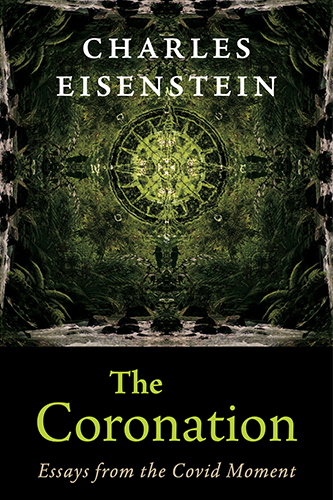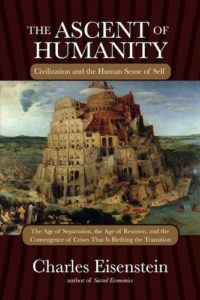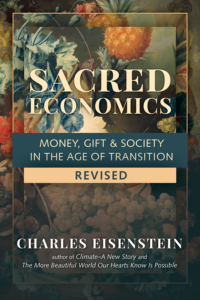Climate — A New Story
Chapters
Chapter 11: An Affair of the Heart
In Science We Trust
If money is the keystone of the arch of modern society, the foundation is surely science. When someone demands we be realistic, often they are referring either to money, or to scientifically verifiable fact. Science provides our culture’s main map of reality. If climate change indeed faces us with an initiation into a new phase of human civilization, then we might expect that science, like money, will undergo a profound metamorphosis.
Except among the religious fringe, science is a primary locus of authority in our society: for at least a century to be “scientific” has been among the highest sources of legitimacy in business, government, medicine, and many other fields. Even those who consciously reject some of science’s teachings aspire to it. As our culture sees science as its foremost means to discover truth, to reject what science says seems the epitome of irrationality, tantamount to a willful denial of truth itself.
I have argued that the portrayal of the climate debate as a clash between the forces of truth and the forces of deception leaves a lot out. This is no mere battle between the intelligent and the stupid, the backward and the advanced, the corrupt and the ethical. The rejection of science, or at least of “what science says,” portends a tectonic shift in the bedrock of civilization as we know it.
Science in our culture is more than a system of knowledge production or a method of inquiry. So deeply embedded it is in our understanding of what is real and how the world works, that we might call it the religion of our civilization. It isn’t a revolt against truth we are seeing; it is a crisis in our civilization’s primary religion.
The reader might protest, “Science is not a religion. It is the opposite of a religion, because it doesn’t ask us to take anything on faith. The Scientific Method provides a way to sift fact from falsehood, truth from superstition.”
In fact, the Scientific Method, like most religious formulae for the attainment of truth, rests on a priori metaphysical assumptions that we must indeed accept on faith. First among them is objectivity, which assumes among other things that the formulation and testing of hypotheses don’t alter the reality in which the experiments take place.[1] This is a huge assumption that is by no means accepted as obvious by other systems of thought. Other metaphysical assumptions include:
- That anything real can in principle be measured and quantified
- That everything that happens does so because it is caused to happen (in the sense of Aristotelian efficient cause)
- That the basic building blocks of matter are generic—for instance, that any two electrons are identical
- That nature can be described by invariant mathematical laws
Philosophers of science might reasonably dispute some of these precepts, which are crumbling under the onslaught of quantum mechanics and complexity theory, but they still inform the culture and mindset of science. Starting from this implicit metaphysics, consider these other ways that science resembles religion.[2] Science has:
- A procedure for attaining Truth (the Scientific Method)
- Elaborate divinatory rituals to gain knowledge (experiments)
- Further rituals (technology) by which we manipulate reality
- Invisible universal spirits (such as “energy” and “forces”) that are responsible for all movement and change
- An esoteric language understandable only by initiates
- Teachings on human nature
- A creation story (the Big Bang and Darwinian evolution)
- Invisible entities (like electrons, mitochondria, etc.) that can be revealed with the help of special implements (like microscopes)
- Special rituals for the purposes of healing (medicine)
- A priesthood, a laity of various degrees of piety, and infidels
- Training for and initiation into the priesthood (graduate school)
- Orders and associations for the priests
- “Preachers”—science writers and popularizers to bring the gospel to the lay masses
- Legendary saints and héros (Darwin, Newton, Archimedes, Einstein, Maxwell, Bohr …)
- Martyrs for the cause (Bruno, Galileo)
- Mainstream sects and wacky cults
- Extremists, fundamentalists, and tolerant moderates
- Doctrinal schisms, heretics, and apostates
- Excommunication of heretics (cutoff of funding, blacklisting from journals)
- A system of ethics and morals (e.g., rational choices, scientific policies)
- A system for the indoctrination of youth
The point here is not to dismiss science on the grounds that it is, after all, nothing but a religion. To do so would be to commit a subtle error: adopting science’s own conception of religion as a term of critique. If, however, we reject the implicit devaluing of religion that comes from contradistinguishing it from science-as-the-royal-road-to-truth, then to name science as a religion is no longer to disparage it. Instead it opens up new questions. We might ask “What are the limitations of the kinds of technology that are available from within this worldview?” and “What other religions—systems of metaphysics, perception, and technology—might be born of the current crisis and needed to address it?” We also might inquire as to what science might become if we abandon some of its metaphysical assumptions. What does it become when we recognize that observer and observed are inextricably entwined? When we recognize the consciousness and agency of all matter? When we cease privileging quantitative over qualitative reasoning?
Science is not alone among religions in having a shroud of dogma and institutional dysfunction around a core spiritual truth. The spiritual essence of the religion of science is the opposite of its institutional arrogance: the Scientific Method embodies a deep and beautiful humility. It says, “I do not know, so I shall ask.” When science is healthy, that humility takes form as critical thinking, patient empirical observation, hypothesis testing, and perhaps most importantly, communities of knowledge seekers who criticize, refine, and build upon each other’s work. The true scientist is always open to being wrong, even at the cost of funding, prestige, and self-image.
Held by a culture of practice, these qualities of humility and experience over time are what make a path of knowledge into a science. My call here is therefore not to discard science but to expand it, to include what it has ignored.
Ecofeminists and deep ecologists have critiqued science for its propensity to abstract, isolate, and distance the observer from the beingness of the observed; to render the world into an object. Francis Bacon conceived the experimental method as an interrogation of nature, even a rape of nature, forcibly penetrating to her deepest mysteries. How might it change if we conceive it as a conversation, not an interrogation; a lovemaking and not a rape? What if we saw science not as a means to force nature into our categories, but as a way to expand the reach of our senses in order to better behold the beloved?
I raise these questions with a certain trepidation, since the conventional view is that any rejection of science is a step backward into long-discredited myths, irrationality, and superstition. I don’t want to be lumped in with the ignoramuses. It seems quite evident to most people that the problem today isn’t too much trust in science but, to the contrary, too little. Consequently, you might think that even if my previous points are, perhaps, philosophically valid, to bring them up in the context of climate change is a strategic error that will embolden climate change deniers and give cover to polluters. I raise them nonetheless, because both the metaphysical assumptions of science and its institutional expression are part and parcel of the system that has laid waste to the world. Science’s reduction of reality to number mirrors the conversion of nature to money. Its universalization of matter into generic particles mirrors the standardization of people and commodities in the industrial economy. And the technology that comes from science facilitates both.
Though it is evolving, science as we have known it (and still to a great degree) has trained us:
To see the world as a bunch of insentient things
To make decisions “rationally”; that is, based on utilitarian calculations
To see the observer as independent from the observed
To see nature as an object of manipulation and control
To ignore the immeasurable and qualitative (spirit, beauty, sacredness, etc.)
To think in mechanistic rather than organic terms
The anti-science public may, for all its apparent ignorance, be tapping in to an authentic intuition about the limits of science as a decision-making compass and the ultimate arbiter of truth. We have to stop seeing public rejection of science and authority in general as some kind of troublesome insubordination, but rather look for the uncomfortable truth within it.
When we say, “Trust the scientific consensus on climate change,” we are also implying:
Trust the social processes by which this consensus is formed.
Trust the other things about which a scientific consensus is declared.
Trust the basic approach to knowledge that science represents.
Trust the tacit metaphysical and ontological assumptions that underpin science.
Trust other institutions that draw their legitimacy from science.
Trust the power of scientific technologies to solve our problems.
In various ways, all of these things we have trusted have contributed, and continue to contribute, to the ongoing devastation of the biosphere. This presents the more radical environmentalist with a conundrum when invoking science in the fight against climate change, because it requires a buy-in to the very same systems of intellectual authority that have long presided over and defended our ecocidal system. In addition, the urgency of action invites the further empowerment of existing institutions, which are the only ones capable of immediate action. The climate activist finds herself in the uncomfortable position of championing and fighting the establishment at the same time.
We are on shaky ground indeed if we are to rely on trust in the institution of science, and by extension trust in authority generally, to deliver us from climate catastrophe. On the rhetorical and strategic level, we need to reach beyond the good little schoolboys and schoolgirls who trust science and believe what the teacher tells them is important. And we need to cleanse ourselves of the stink of self-righteousness that comes when we hold in contempt those who don’t understand science (or patronize them as recalcitrant rubes to be “educated” in a dumbed-down version of it). “Science says” is not going to reach the farmers, hunters, ranchers, and other people who (in the United States) typically have conservative political identities, voted for Donald Trump, and are polarized into the climate skeptic position. Nor will it much impress working-class people who feel, quite understandably, that the establishment has betrayed them.
Recent political events like Brexit and the Trump election point to a growing popular rejection of established authority. Normally attributed to bigotry, xenophobia, and, tellingly, “irrationality,” these events point to a morbid crisis in the legitimacy of our dominant institutions and the elites who run them. It will only worsen as the concentration of wealth intensifies and the social contract frays further. It will worsen as the mainstays of our society—medicine, education, and law—veer closer to absurdity in their dysfunction. It will worsen as progressive and conservative governments alike fail to fix the political system. It will worsen as people realize the power and beauty of what has germinated outside the bounds of normalcy, in the “alternative” realms.
Many people have direct experiences that contradict what science and authority generally tell them is real and possible. A friend’s lifelong menstrual cramps disappear for good after a few acupuncture sessions, in spite of her extreme skepticism. A woman recovers from “incurable” stage four pancreatic cancer. A man experiences direct communication with his ancestors in an iboga ceremony and ends his drug addiction. Rival gangs meet in a restorative circle and come to peace. My son’s teenage friends see a UFO. Experiences like these open people to further experiences. When the “impossible” happens, we begin to question the bounds of the conventionally possible.
Some of the most highly educated people I know are devoted to astrology: an academic philosopher, a law professor, a medical anthropologist. These are not people who are too stupid to understand that the gravitational influence of other planets is negligible. Nor are they ignorant of confirmation bias, nor of the mind’s proclivity to perceive illusory patterns in random noise. These are highly intelligent, self-reflective people. You can write them off as superstitious nincompoops who are less rational than you are, but on what evidence? Because you just know that the worldview of institutional science, and its account of causation, is identical to reality itself? Likewise, can you be sure that cultures around the world that have maintained divinatory practices for thousands of years were simply oblivious to the mind’s capacity for self-deception? Is it that we are wise and they are stupid, that we are advanced and they are primitive, and that our historical duty is to replace their inferior ways of knowing with our superior ones? That mentality seems more like part of the problem than part of the solution.
Ironically, many of the very same people who embrace energy healing, astrology, crop circles, and so on also add their voices to the call for “science-based policy” on climate. Meanwhile in their own lives, they apply I Ching–based policy, Tarot-based policy, or astrology-based policy. This exemplifies the wall of separation that keeps spirituality and politics in separate realms. That is a division that must crumble. The key to our salvation lies beyond what science currently offers—it lies in facing the world as a living being, a sacred being, and a beloved being. From that place, technologies and practices emerge far beyond what science thinks is possible today. The astonishing results of regenerative agriculture are just a taste of what can happen when we think, “Land, I know you want to heal. Please tell me how to serve you. Land, I know you want to give. Please tell me how to serve you. Land, I know you want to fulfill your highest purpose. Please tell me how to serve you.”
This is the state of heart and mind from which the insights of regenerative agriculture and ecological healing arise.
Science can be a powerful tool to ask these questions and hear the answers. I am not advocating replacing it with Tarot decks, or indeed with the divinatory practices of other cultures who did indeed use exquisite rituals to maintain balance with the land. What needs to change is the impulse behind the science: the manipulation of a world it sees as dead—atoms and void. When that view changes, science will morph into something we can hardly recognize. It will share the animating force of indigenous ways of communicating with nature; it will be a step toward recovering our own indigeneity. That word must mean to be truly of a place, to be intimate with a place and all its beings. In the end, it does not matter if we enact the technological rituals of science, or some other religion. What matters is that we return to love.
Look at it this way. You don’t enact “science-based policy” in affairs of the heart, do you? You enact, I hope, love-based policy, or maybe hate-based policy or fear-based policy. You might dress them up with reasons, but love is not reasonable. If we want to enact unreasonable commitment to the healing of the earth, we need to make our relationship with it into an affair of the heart. Otherwise, the catastrophists may be right.
End Notes
[1] See Burtt’s 1925 treatise The Metaphysical Foundations of Modern Science for a thorough discussion of the origins of unquestioned metaphysical assumptions in the conceptual categories established by Isaac Newton.
[2] Not all religions have the following traits, but most institutional religions bear many of them. Obviously, the closest cousin to science in its structure is Catholicism.






